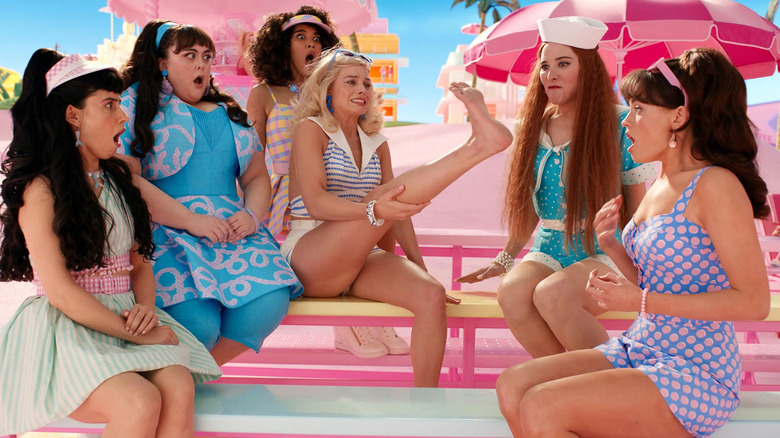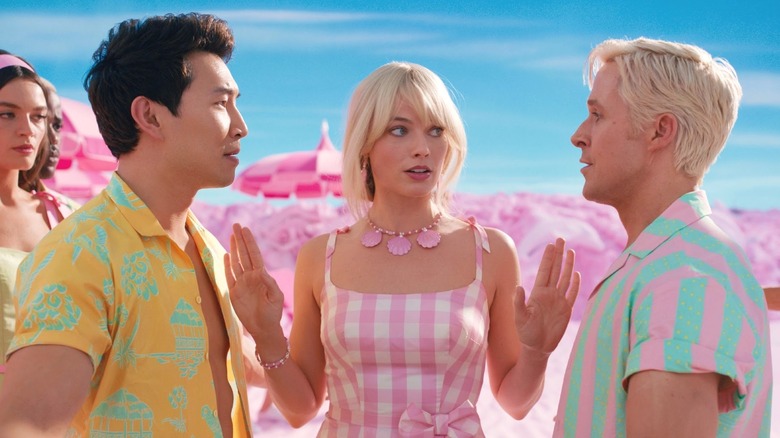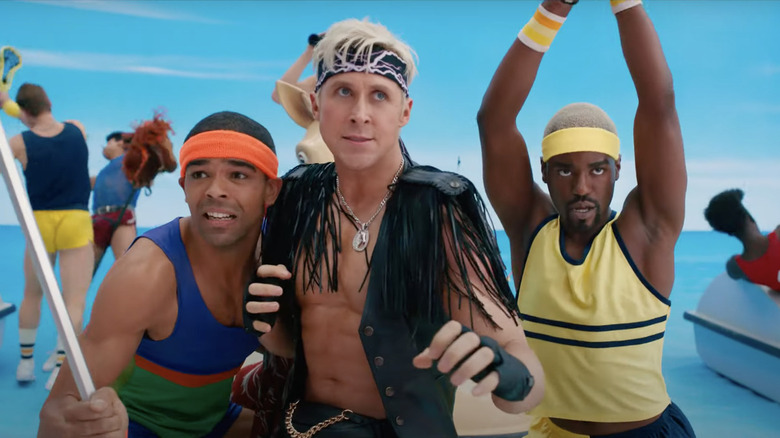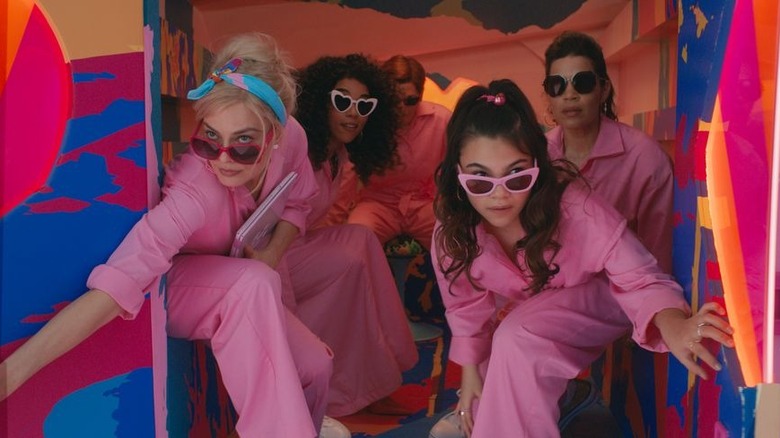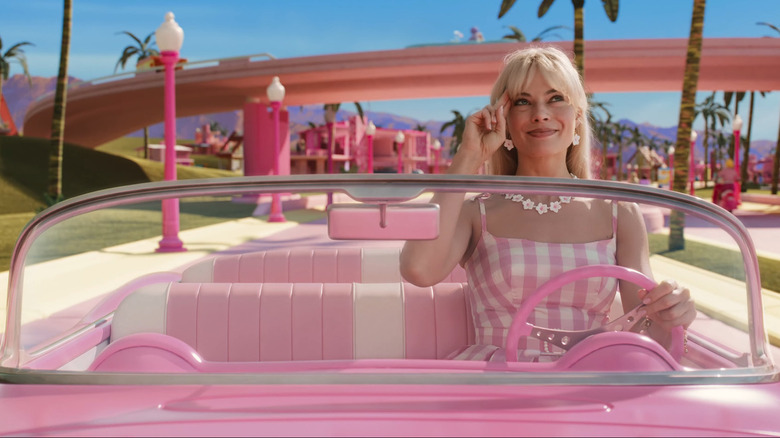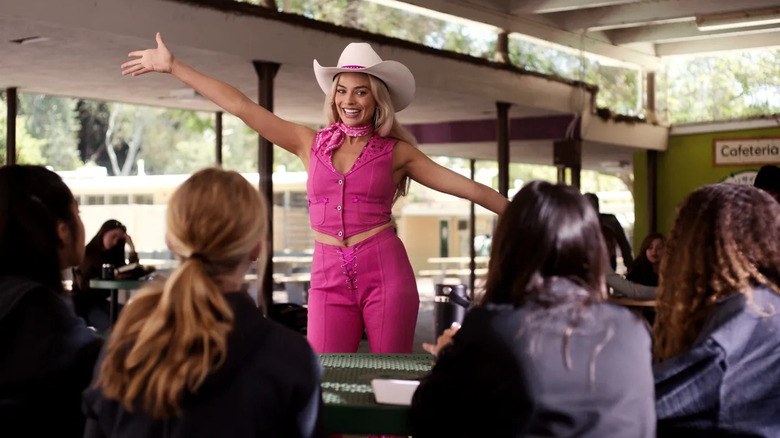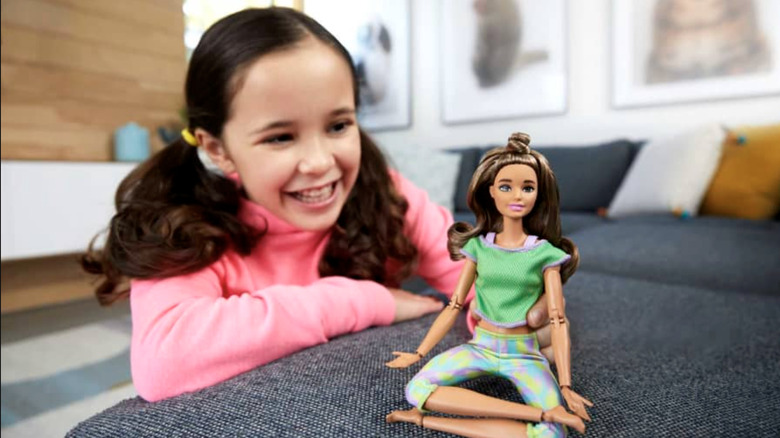Greta Gerwig's Barbie Ending Explained: Barbie Finally Finds Her Pointed Footing
This piece was written during the 2023 WGA and SAG-AFTRA strikes. Without the labor of the writers and actors currently on strike, the movie being discussed here wouldn't exist. This article also contains spoilers for "Barbie."
Greta Gerwig has made a name for herself as a filmmaker by telling touching coming-of-age stories like "Lady Bird" and "Little Women," and her hot pink blockbuster "Barbie" is no different. Borrowing elements from the extensive lore of the famous doll and the brand's mark on pop culture, Gerwig weaves the idea of Barbie within the parameters of our own patriarchal society and muses on how the expectations of women aren't so different than what is expected of Barbie. This realization allows Barbie to finally come of age and come to terms with what it's really like to navigate the world as a woman.
As existential as "Barbie" is as a story, it's also a laugh-out-loud romp with eye-popping production design. The opening of "Barbie" lulls the audience into a sense of familiarity, feeling like the most expensive advertisement for the Mattel corporation ever made, but that's before peeling back layer after layer, like a wardrobe of Barbie fashions, until the heart of the film is laid bare. Barbie and Barbieland is an idea, not a reality, and it's when we learn to accept that difficult truth that we can all begin to heal, move forward, and overcome the cruel structures of human existence.
You can read our review of the film here, but in case you still have questions, here's the ending of "Barbie," explained.
What you need to remember about the plot of Barbie
Following an opening sequence riffing on Stanley Kubrick's "2001: A Space Odyssey," the Narrator (Helen Mirren) and the musical stylings of Lizzo walk us through the day in the life of Stereotypical Barbie (Margot Robbie), where "it is the best day ever and so was yesterday, and so is tomorrow, and every day from now until forever." Barbies hold every position of power in Barbieland, and the Kens exist to impress them. Stereotypical Barbie throws a huge party for everyone in Barbieland, but is plagued with irrepressible thoughts of death. She thinks it's a fluke, but the next day she wakes up and discovers cellulite on her thighs and that her pointed feet have dropped flat. She is sent to visit Weird Barbie (Kate McKinnon) for advice, who instructs her to visit the real world and figure out what's going on with the human being playing with her.
This sends Barbie on the trip of a lifetime, along with Ken (Ryan Gosling), who stowed away to join her. The duo experiences a massive culture shock once they land in Los Angeles, learning that the real world is incredibly hostile towards women. Furthermore, due to the patriarchy, men are in control. Barbie finally tracks down Gloria (America Ferrera) and her daughter Sasha (Ariana Greenblatt), the owners of her doll in real life, and she's devastated to learn that a lot of women actually despise Barbie, and they even blame her for many of the problems women face. As Barbie is thrown into an existential crisis, Ken is emboldened by this new reality where men rule the world, and he races back to Barbieland to inform the Kens.
Barbie takes a little more time experiencing the real world, but when the executives at Mattel hear that a Barbie is running around Los Angeles, they send a crew out to kidnap her to bring her to Mattel's headquarters in the hopes of putting her back in the box and sending her back to Barbieland for good. They almost succeed too, until Barbie panics about going back in the box and makes a run for it, sparking all of Mattel to try and catch her as she attempts to escape the building. Barbie hides out in a room behind an unlocked door, and finds that an older woman is sitting in a kitchen with a cup of tea. She introduces herself as Ruth and gives Barbie some words of comfort before sending her back out of Mattel, and into Gloria's car.
Down with the patriarchy
Along with Gloria and Sasha, Barbie eventually returns to Barbieland but discovers that the Kens have taken over, turning it into a Kendom. It's a cartoonish portrayal of masculinity, loading up Dreamhouses with foosball tables and minifridges stocked with beer, and relegating all of the Barbies to sexy, submissive servants. The Barbies have all been brainwashed into thinking this is the better way of living, because they don't have to actually think about anything anymore, and they have completely given up their autonomy.
This sends Stereotypical Barbie into an even deeper depression, and she gives up, believing that Barbieland is doomed to be as broken as our own real world. In an attempt to make things right, Gloria delivers a moving speech about how women in the real world have to face horrible, complicated, oftentimes nightmarish contradiction and adversities in order to survive. But Gloria also urges Barbie not to give up, because she's not alone.
Barbie, Gloria, and Sasha meet up with Weird Barbie and her house of canceled Barbies to formulate a plan to restore all of the brainwashed Barbies, reminding them who they are on the inside and that the patriarchy is actually a horrible system. Once they've successfully deprogrammed the Barbies, they all work together to take back Barbieland from the Kens by weaponizing their own toxic masculinity against each other.
What happened at the end of Barbie?
The Barbies have all joined forces in committing a bit of psychological warfare, letting their respective Kens play "Push" by Matchbox 20 at them before intentionally flirting with different Kens to pit them against one another in jealousy. The Kens can't handle these huge emotions they're experiencing, so they decide to battle with one another on the beach. With all of the Kens too distracted with their own macho posturing to pay attention to what the Barbies are doing, the Barbies meet at the capitol and pass legislation restoring their power.
The Kens had their fun, but they're fine with going back to how things used to be in Barbieland. However, Ryan Gosling's Ken is crushed. The Barbie of his dreams doesn't want him, he's no longer in charge of the Kendom, and he has a full-blown identity crisis in the Dreamhouse. Stereotypical Barbie tells Ken that he should take some time to figure out who he really is, outside of being with Barbie. He fights it at first, but he's then excited at the prospect of finally getting in touch with who he really is inside. This moment is perfection, because it hammers home the heart of the gender theory of "Barbie," which is that the patriarchy hurts everyone.
Mattel's board of directors, led by Will Ferrell as the company's CEO, then shows up (having followed Barbie back to Barbieland after being worried about their real world arrival), and Gloria takes the opportunity to pitch "Ordinary Barbie," a doll that isn't perfect but rather a reflection of a more realistic woman. The board agrees, but only after their quick data search proves that "Ordinary Barbie" will make them a lot of money. Lest we forget, Mattel is still a corporation, and money will always talk the loudest.
But what about Barbie, the character?
Once balance has been restored to Barbieland, Sasha looks to Stereotypical Barbie and poses the question, "What's Barbie's ending?" After having experienced the real world, it's clear that Barbie can't unlearn what she knows, and she no longer feels like Barbieland is where she's meant to be. At this point, Ruth reappears and clarifies to the audience (that didn't already know who she was) that she is the ghost of Ruth Handler, the woman who created Barbie. She tells her that she even named Barbie after her own daughter, Barbara, and that she never created Barbie with an "ending" in mind.
"Humans only have one ending," she tells her. "Ideas live forever." Barbie takes Ruth's hand and leaves Barbieland, no longer wanting to be an idea, and she accepts this choice means that someday she will face the inevitable. Thinking about dying is no longer a theoretical concept for Barbie, it's about to become very real. Ruth tells Barbie that being human is filled with hardships and discomfort, but it can also be very wonderful. She shows Barbie a montage of women of all ages, living their lives in beautiful, messy, and varied ways. Seeing the montage solidifies her decision, and Ruth disappears. Barbie wants to become human.
In the film's final scene, Barbie is in the real world with Gloria, Sasha, and Sasha's Dad/Gloria's husband, who are taking her to an appointment. Now wearing sensible but fashionable Birkenstocks, she enters a building and checks in with a receptionist as "Barbara." The appointment? Why, she's having her first visit to the gynecologist, because now that she's no longer a doll, she's got some new organs to figure out!
Will we get a Barbie sequel?
The Mattel corporation has already announced that they intend on making their own cinematic universe based on their popular brands which include Barbie, Hot Wheels, Monster High, Power Wheels, Polly Pocket, Masters of the Universe, Fischer-Price, and American Girl. Given the immediate success of "Barbie," it seems like a sequel would be a no-brainer. But considering the satisfying ending, a spin-off might be more reasonable. "It could go a million different directions from this point," Margot Robbie recently told Time of a potential sequel. "But I think you fall into a bit of a trap if you try and set up a first movie whilst also planning for sequels." Robbie served as an executive producer on "Barbie" in addition to starring, so she will definitely have a say in how the story moves forward, if at all.
Director Greta Gerwig has also discussed the possibility of future Barbie movies and doesn't seem to be against the idea of a full-on Barbie franchise. "Honestly, I'm just focused on getting this one out and crossing all my fingers and toes," Gerwig told Entertainment Tonight. "And then we'll see what happens after that." Late last year, Gerwig told Variety a Barbie Cinematic Universe wasn't completely outside the realm of possibility, but that there weren't any guarantees. "I mean, it would certainly be exciting if it was," she said.
Will Mattel make Ordinary Barbie?
While Mattel has not released any official plans to make Gloria's "Ordinary Barbie" pitch, the Barbie line has expanded greatly in recent years. Barbie now comes in 35 skin tones, 97 hairstyles, and nine body types with more additions being made every year. Barbie has made bald dolls, dolls with hearing aids, dolls with vitiligo, dolls with prosthetic limbs, the first Barbie with Down syndrome, and with the release of The Barbie Tribute Collection Laverne Cox Doll, a transgender Barbie.
High-fashion Barbies, Barbies based on historical figures, and Barbies with specific jobs are, of course, still being made, but there's now a Barbie Self Care line that includes posable dolls in comfy clothes so they can do yoga poses. These Barbies aren't exactly the "Ordinary Barbie" that Gloria described, but they're pretty close. It wouldn't be surprising if Mattel added a Barbie in sweat pants with a couch accessory. Hey, Barbie has to relax and prevent burnout, too!
"Barbie" is playing in theaters everywhere now.
